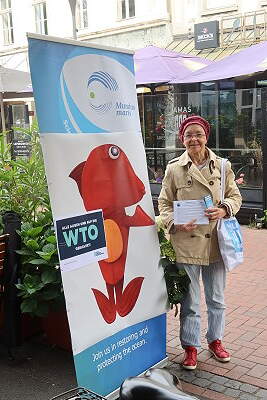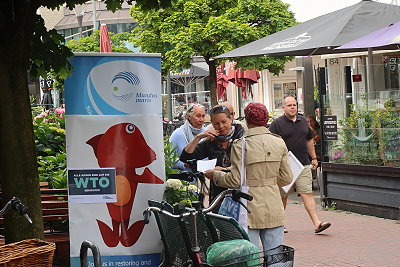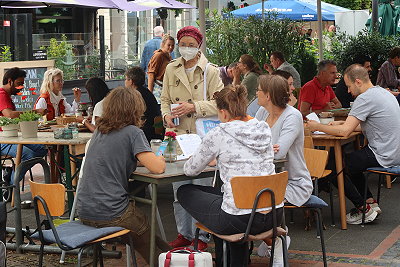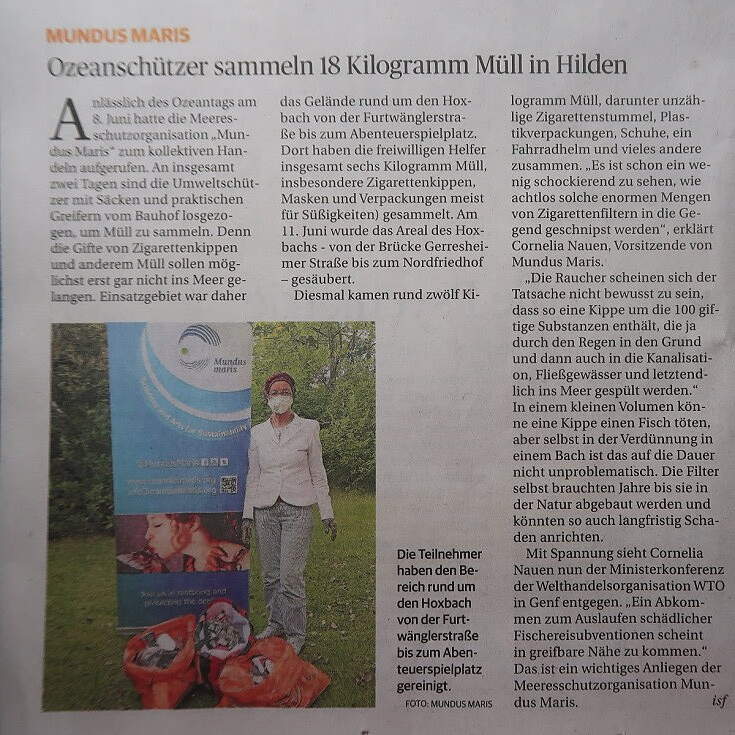 With World Ocean Day, 8 June, and the beginning of the 12th Ministerial Conference of the World Trade Organization (WTO) in Geneva around the corner, it was an opportunity not to be missed to inform more broadly about the importance of phasing out harmful fisheries subsidies and thus stop spending tax payers‘ money on funding industrial overfishing of the ocean. Having missed the deadline of 2020 to deliver on their mandate, target 14.6 of the Sustainable Development Goals (SDGs), expectations are that WTO finally cuts the overdue deal and reports progress to the UN Ocean Conference, taken place shortly afterwards in Lisbon, Portugal, from 27 June to 1 July. Mundus maris is part of a very large alliance of civil society organisations following the negotiations in the WTO since several years and mobilising public pressure to achieve a substantive deal. We reported repeatedly in our monthly newsletter. The alliance supported the Chair, Ambassador Wills of Colombia, and the new Director General of WTO, Dr. Ngozi Okonjo-Iweala, former minister and
With World Ocean Day, 8 June, and the beginning of the 12th Ministerial Conference of the World Trade Organization (WTO) in Geneva around the corner, it was an opportunity not to be missed to inform more broadly about the importance of phasing out harmful fisheries subsidies and thus stop spending tax payers‘ money on funding industrial overfishing of the ocean. Having missed the deadline of 2020 to deliver on their mandate, target 14.6 of the Sustainable Development Goals (SDGs), expectations are that WTO finally cuts the overdue deal and reports progress to the UN Ocean Conference, taken place shortly afterwards in Lisbon, Portugal, from 27 June to 1 July. Mundus maris is part of a very large alliance of civil society organisations following the negotiations in the WTO since several years and mobilising public pressure to achieve a substantive deal. We reported repeatedly in our monthly newsletter. The alliance supported the Chair, Ambassador Wills of Colombia, and the new Director General of WTO, Dr. Ngozi Okonjo-Iweala, former minister and
environmental sustainability advocate born in Nigeria, through countless public actions, media campaigns and comments on draft treaty texts. Why is a WTO deal so crucial?
 Because few governments with substantial long distance fleets spend about 22 billion USD per year of tax money to prop up oversized fleets stealing dwindling resources particularly from developing countries in Africa, Asia and Latin America. Only a small percentage of subsidies goes to coastal small-scale fisheries in such countries, which provide for about 25% of the fish food from the ocean. It is clear that despite their important role in local food security these small-scale fishers are no match for industrial fleets fishing for subsidies. These subsidies finance infact overfishing operations, which have already much reduced global catches since the mid-1990s.
Because few governments with substantial long distance fleets spend about 22 billion USD per year of tax money to prop up oversized fleets stealing dwindling resources particularly from developing countries in Africa, Asia and Latin America. Only a small percentage of subsidies goes to coastal small-scale fisheries in such countries, which provide for about 25% of the fish food from the ocean. It is clear that despite their important role in local food security these small-scale fishers are no match for industrial fleets fishing for subsidies. These subsidies finance infact overfishing operations, which have already much reduced global catches since the mid-1990s.
 Without the subsidies, probably half the industrial fleet would not be economically viable and stop, thus giving resources a respite to recover and even saving the future of small-scale fishers and their catches. How important subsidies are can be seen e.g. in Europe, where a large chunk of the fleet remains tied up because of the steep rise in fuel costs. These tend to account for more than 60% of the overall operating costs, especially for distant water industrial vessels. Moreover, recent research into the particularly harmful industrial bottom trawling industry has shown that not only does it destroy essential habitat on the sea bottom, but also produces CO2 emissions likely higher than the aeronautics industry! At a time, when giving up our addiction to fossil fuels is entering the center stage of public conscience and societal debates, maintaining fuel subsidies for such industries feels completely fallen out of time, while artisanal fishers many well need public support to tie them over the current crisis. On Saturday, 4 June, Mundus maris organised an information action at the town centre in Hilden, Germany, drawing attention to World Ocean Day and the urgency of WTO to deliver on its mandate to releave public finances of these harmful subsidies. While not a major fishing nation and rather a huge net fish importer, Germany provides more subsidies to its industry than the catch is worth. It is thus aggravating the poor state of resources and drawing on the public purse already strained through multiple crises and at risk of making cuts to budgets to the socially and economically vulnerable. The European Parliament has recently supported a motion against bottom trawling. Supporting a deal in the WTO would be a logical next step, especially as the reformed EU Common Fisheries Policy prohibits overfishing. Many people took advantage of the good weather and the relaxed mood before the long weekend of Pentecost enjoying outdoor cafés or just strolling in the pedestrian zone, where we had set up Finlay, the WTO campaign mascot, next to a fish restaurant. Especially the younger ones were quite open to a discussion taking the event flyer and asking for more information. The regional newspaper Rheinische Post reported on June 7 about World Ocean Day challenges and how Mundus maris responds to them with an article in the local section and a teaser on the front page.
Without the subsidies, probably half the industrial fleet would not be economically viable and stop, thus giving resources a respite to recover and even saving the future of small-scale fishers and their catches. How important subsidies are can be seen e.g. in Europe, where a large chunk of the fleet remains tied up because of the steep rise in fuel costs. These tend to account for more than 60% of the overall operating costs, especially for distant water industrial vessels. Moreover, recent research into the particularly harmful industrial bottom trawling industry has shown that not only does it destroy essential habitat on the sea bottom, but also produces CO2 emissions likely higher than the aeronautics industry! At a time, when giving up our addiction to fossil fuels is entering the center stage of public conscience and societal debates, maintaining fuel subsidies for such industries feels completely fallen out of time, while artisanal fishers many well need public support to tie them over the current crisis. On Saturday, 4 June, Mundus maris organised an information action at the town centre in Hilden, Germany, drawing attention to World Ocean Day and the urgency of WTO to deliver on its mandate to releave public finances of these harmful subsidies. While not a major fishing nation and rather a huge net fish importer, Germany provides more subsidies to its industry than the catch is worth. It is thus aggravating the poor state of resources and drawing on the public purse already strained through multiple crises and at risk of making cuts to budgets to the socially and economically vulnerable. The European Parliament has recently supported a motion against bottom trawling. Supporting a deal in the WTO would be a logical next step, especially as the reformed EU Common Fisheries Policy prohibits overfishing. Many people took advantage of the good weather and the relaxed mood before the long weekend of Pentecost enjoying outdoor cafés or just strolling in the pedestrian zone, where we had set up Finlay, the WTO campaign mascot, next to a fish restaurant. Especially the younger ones were quite open to a discussion taking the event flyer and asking for more information. The regional newspaper Rheinische Post reported on June 7 about World Ocean Day challenges and how Mundus maris responds to them with an article in the local section and a teaser on the front page.

